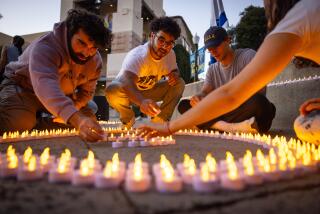The Red Army Remembers
Yvenalia Rosenman stood straight and solemn under a near-summer sun that warmed his body as much as his passion for his native Ukraine. Waving 76-year-old hands still as steady as a young marksman’s, he talked about a soldier’s bittersweet pride, about his Red Army uniform festooned with medals garnered in the Second World War.
“I earned this uniform,” he said through a Russian translator, his voice shaking. “The things I saw, the friends I lost. I’m not ashamed to wear it. This old piece of cloth makes me proud. It makes me think of them.”
More than 200 strong, members of West Hollywood’s community from the former Soviet Union gathered Friday in Plummer Park to observe the anniversary of the end of World War II--for these foreign-born soldiers, celebrated each May 9. Sponsored by West Hollywood City Councilman Steve Martin and the Los Angeles Russian War Veterans Society, it was a time to talk about war and be thankful for peace.
Indeed, this was a day seen from a particularly Eastern European point of view--a day when tearful women handed bouquets of flowers to men they barely knew, a day containing memories of friends and other heroes shot dead or blown apart by enemy tanks and land mines.
It was a morning reserved to recall a host of Nazi atrocities and to hark back to awkward first meetings with gung-ho American soldiers who back then seemed ruddy-faced, healthy and other-worldly compared with a Soviet army that fought a war with nothing.
Efim Kutz, 74, was a colonel in the Red Army back in that terrible spring of 1945, when his troops marched east across Czechoslovakia to meet their American counterparts. The two armies converged near the River Elbe, Kutz recalled, and neither he nor any other of his Soviet compatriots were prepared for what they saw.
“Nobody had ever seen an American before,” he said. “They looked so different from our own soldiers. Their uniforms were different. Their faces were different, like the faces of angels, we all said.”
Unlike the well-prepared American troops, Kutz said, his men--who were more children than soldiers--fought without proper clothing or weapons. Some units went to battle with 10 men to a single rifle. But when they saw the Americans that day, he said, they knew that the tortures, the shortages and the bloody war itself were all finally over.
For these Red Army veterans--Russians, Ukrainians, Armenians and Jews--who collected under the shade of several towering trees while temperatures soared, Friday was a proud day; they have seen the ranks of their Russian War Veterans Society grow from just a dozen a few years back to more than 850.
Councilman Martin, noting that about 12,000 former Soviet immigrants have settled in West Hollywood--said he suggested the annual celebration for local Red Army war veterans after a 1995 parade brought out thousands of veterans and their families, who dabbed their eyes with handkerchiefs at the observance.
“It’s just a few moments to show off their medals and remember,” he said. “It’s bittersweet. They’ve lost family members and friends. They’ve lost husbands and wives and grandfathers. They’ve lost limbs and show scars they’ve carried for 50 years.”
Something was different on this morning, at these same park benches where the retirees often run into one another on morning outings. It wasn’t just the uniforms and the medals, but the showing off of the scars, the mentioning of the gashes in legs and the missing arms.
Kutz said: “We’re all getting old. We won’t be around much longer. Pretty soon, the younger generation won’t even remember that we fought or what we fought for.”
But Boris Fomin, a 16-year-old who came out of curiosity, said he didn’t view the group as doddering old men who refuse to forget the past.
“They’re heroes,” he said. “I know what happened in history. Without them, Russia would be occupied by German soldiers right now.”
Prior to a brief ceremony during which U.S. Army officials and others spoke before the crowd, the veterans heard an organ player perform songs they sang during the war, including one with lyrics that say all soldiers who die in war return to earth as white birds.
As an honor guard paced slowly through the crowd, followed by men in uniforms--some now fitting tightly across the stomach, others fitting as trimly as the day they first were worn, the spectators looked on uncomfortably, nervously glancing about as though they feared someone might suddenly stop the proceedings.
Then, one by one, they began to clap and stamp their feet. And some began to cry.
Wearing a dapper blue beret over a uniform decorated with 25 medals, 74-year-old Arkady Skursky said he wished he personally could thank the American soldiers who lost their lives.
“They helped us kill Germans,” he said, his eyes tearing. “They made the job easier.”
Merita Elmer, a former Leningrad teacher, said she came to thank the Red Army veterans--in particular, the soldiers who liberated her city after 900 days under Nazi siege, a time when 30,000 people died daily of cold and starvation.
“I live alone and I have no one,” she said. “So these men are my family. I come to thank them from the bottom of my heart.” Nearby, sitting on a shaded beach, 72-year-old Isaak Shuman was asked if he lost any friends in the war.
“Many,” he said, looking away.
“Thousands, thousands.”



